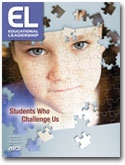Two teachers made all the difference in his life—one for the better, one for the worse. Lucky for him, the bad experience came first.
Easily distracted, willful, always out of his seat, acting out, refusing to participate in any lesson he thought was stupid or boring, Brian was a challenging kid. His 2nd grade teacher told him so, in the presence of his mother. Mrs. C's exact words: "There is something wrong with you." For the rest of 2nd grade, Brian made it his mission to get in trouble every day.
Brian eventually earned the school record for having to write the most sentences that began with "I must not … ." Even after he mercifully graduated from Mrs. C's classroom, his reputation—and her words—stayed with him. For the next three years, Brian gave his 3rd, 4th, and 5th grade teachers—all good teachers, he is quick to say—a run for their money, earning himself countless visits to the principal's office, lost recesses, detentions, calls home, and a place in the lowest achieving class. He didn't do any work, he wasn't a good reader, and he didn't seem to care.
Then came Mrs. Kaufman—I'll use her real name here. Mrs. K had a roomful of challenging 6th graders. She didn't single Brian out when she kept him after school; she made a lot of kids stay after, usually individually. She told Brian he was a leader and could achieve great things. She explained to him why he needed to learn to read well, why learning about prepositions might be boring but was necessary, how he needed to learn to write with "voice." She challenged him—and made it possible for him—to catch up.
"My trajectory was changed forever," Brian Nichols relates. "Mrs. Kaufman looked past the kid who stood before her and saw the kid I could become. In 6th grade, I decided I wanted to be a teacher."
Brian did become a teacher, then a principal, and, now, as the director of school leadership for 24 schools and four early childhood centers in Newport News, Virginia, he tells his story to the beginning teachers in his district. "Educators have a tremendous power to work within school walls," he tells them. "Some of our kids"—he doesn't use the words "at-risk" or "challenging"—"are 'school dependent.'" "School dependent" describes kids who depend on their schools to make a difference in their lives.
In this issue on "Students Who Challenge Us," EL authors echo Brian's words as they unravel the common threads in the lives of those students who are considered challenged or challenging in school. Whether challenges bubble up from issues at home, poor student/teacher relationships, learning problems, emotional or physical differences, or a combination of many factors, the root causes are often complex and difficult to discover without the combined efforts of many educators willing to build positive relationships with students and their families. Almost always, to reach those students on a personal level, it's necessary to abandon negative perceptions and assumptions in favor of identifying student strengths and abilities to build on (p. 10).
In addition to writing about the psychology and mind-set educators need to address such behaviors as absenteeism (p. 50), bullying (p. 26), and confrontational behavior (pp. 18, 32), several of our authors share their personal insights about grappling with the labels and realities of such challenges as ADHD (p. 36), autism (p. 40), and Tourette syndrome (p. 46). Others describe strategies that did or didn't work for their students in varying circumstances (pp. 62, 67, 71, 76). And some write about what their most challenging students taught them about becoming a better educator (p. 90).
"Although teachers may feel at times that they cannot control challenging behavior, there are variables they can control," say Nancy Rappaport and Jessica Minahan, who write about oppositional, anxious, and withdrawn students. "By understanding what the student is communicating, figuring out replacement behaviors, and building a strong relationship, teachers discover that seemingly intractable behavior can diminish and students can thrive" (p. 25).
Today, Brian Nichols, former challenging student, sees his biggest challenge as "scaling up the pockets of greatness I see in schools. … Whether our students are challenging, compliant, actively engaged, or passively disengaged, we must wrap our resources around them so that they can become the adults they were meant to be."
That's what Mrs. K did for Brian, and he will always be grateful.
<P ID="scherer-audio">add scherer audio here<!--***** bcove links ********http://bcove.me/2s1bwy7hhttp://video.ascd.org/services/player/bcpid18377529001?bckey=AQ~~,AAAAAmGjiRE~,escbD3Me8-wT_coVb7sTe18vG6vv3Oyk&bctid=1836053397001--><!-- Start of Brightcove Player --><!--div style="display:none"></div--><!--By use of this code snippet, I agree to the Brightcove Publisher T and C found at https://accounts.brightcove.com/en/terms-and-conditions/. --><!--***** for vcm ******** --><!--<object id="myExperience1836053397001" class="BrightcoveExperience"> <param name="bgcolor" value="#FFFFFF" /><param name="width" value="570" /><param name="height" value="380" /><param name="playerID" value="18377529001" /> <param name="playerKey" value="AQ~~,AAAAAmGjiRE~,escbD3Me8-wT_coVb7sTe18vG6vv3Oyk" /> <param name="isVid" value="true" /><param name="dynamicStreaming" value="true" /><param name="@videoPlayer" value="1836053397001" /> </object>--><!-- This script tag will cause the Brightcove Players defined above it to be created as soonas the line is read by the browser. If you wish to have the player instantiated only afterthe rest of the HTML is processed and the page load is complete, remove the line.--><!-- End of Brightcove Player --><!--***** for htm; ******** <object id="flashObj" width="570" height="380" classid="clsid:D27CDB6E-AE6D-11cf-96B8-444553540000" codebase="http://download.macromedia.com/pub/shockwave/cabs/flash/swflash.cab#version=9,0,47,0"><param name="movie" value="http://c.brightcove.com/services/viewer/federated_f9?isVid=1" /><param name="bgcolor" value="#FFFFFF" /><param name="flashVars" value="videoId=1836053397001&playerID=11490813001&playerKey=AQ~~,AAAAAmGjiRE~,escbD3Me8-zfW2J4SI2ZSHPsqtup23tT&domain=embed&dynamicStreaming=true" /><param name="base" value="http://admin.brightcove.com" /><param name="seamlesstabbing" value="false" /><param name="allowFullScreen" value="true" /><param name="swLiveConnect" value="true" /><param name="allowScriptAccess" value="always" /><embed src="http://c.brightcove.com/services/viewer/federated_f9?isVid=1" bgcolor="#FFFFFF" flashVars="videoId=1836053397001&playerID=11490813001&playerKey=AQ~~,AAAAAmGjiRE~,escbD3Me8-zfW2J4SI2ZSHPsqtup23tT&domain=embed&dynamicStreaming=true" base="http://admin.brightcove.com" name="flashObj" width="486" height="412" seamlesstabbing="false" type="application/x-shockwave-flash" allowFullScreen="true" swLiveConnect="true" allowScriptAccess="always" pluginspage="http://www.macromedia.com/shockwave/download/index.cgi?P1_Prod_Version=ShockwaveFlash"></embed></object>-->

